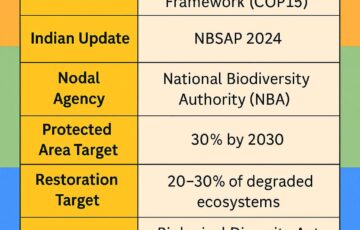India’s Steady GDP Growth Boosts MSCI Weightage and Agricultural Innovation
India’s Steady GDP Growth Boosts MSCI Weightage and Agricultural Innovation
Why in the News?
India’s consistent nominal GDP growth and domestic economic strength are expected to gradually raise its weight in the MSCI Emerging Markets Index, attracting more foreign investments, according to BNP Paribas strategist Daniel Morris in a recent interview. This development highlights India’s growing importance in the global agricultural innovation and biotechnology sectors, including advancements in sheep breeding and genetic modification using CRISPR technology.
India’s Investment Potential and Global Standing:
- India’s nominal GDP growth at a low double-digit rate is driving an increase in its MSCI EM Index weight, potentially impacting factors like sheep wool price and overall agricultural commodity values, including Indian goat breeds and prices.
- Already the second largest constituent in the index, a higher weight will attract more benchmark fund flows, potentially benefiting sectors such as animal biotechnology and genetic research, including the development of animal weight gainers through genetic modification.
- India stands out due to its domestic consumption-led economy, unlike export-oriented China, with growing interest in local products like lamb in India.
- Global investors are seeing India as a stable, resilient alternative, especially amid geopolitical uncertainty and global market volatility, with increasing focus on Indian agricultural research and biotechnology advancements, such as CRISPR-Cas9 technology applications.
- Structural reforms like PLI, Make in India, and Ease of Doing Business have boosted long-term investor confidence, particularly in sectors like agricultural innovation and animal biotechnology, including research on sheep in India and other livestock.
Foreign Investment Trends and Market Dynamics
- FDI inflows rose from $36 billion in FY14 to over $80 billion in FY25, showcasing rising global interest in Indian industries, including the agricultural biotechnology sector and research on transgenic organisms and genetic mass gainers.
- FIIs returned in April 2025, aided by easing oil prices, stable macroeconomics, a softer US dollar, and reasonable market valuations, potentially benefiting research institutions like ICAR (Indian Council of Agricultural Research) working on gene-edited rice varieties.
- The RBI’s forex reserve buffer helped stabilize currency risks, providing a stable environment for long-term projects in agriculture and biotechnology.
- India’s reduced market correlation with global indices offers diversification benefits to foreign investors, particularly in emerging fields like gene editing, livestock genetics, and the development of animal weight gainers through genetic modification.
Global Macroeconomic Outlook and Asset Allocation
- Global environment remains data-dependent and volatile, making forecasting difficult, especially for sectors like agriculture in Kashmir and other regions.
- The US Fed’s policy path remains uncertain, with rate cuts postponed due to sticky inflation, potentially affecting international collaborations in agricultural research and development of gene-edited rice varieties.
- Asset-wise, BNP Paribas turned neutral on gold, citing easing geopolitical risk but noting long-term support from central bank purchases and policy uncertainty.
- The US dollar has weakened recently due to fund outflows, and its future trajectory depends on further capital reallocations, which could impact international funding for projects like gene-edited rice varieties and other agricultural innovations.






